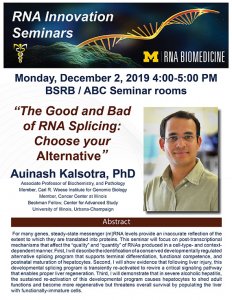Presented By: Center for RNA Biomedicine
RNA Innovation Seminar, Auinash Kalsotra, University of Illinois at Urbana-Champaign
"The Good and Bad of RNA Splicing: Choose your Alternative"

Auinash Kalsotra, PhD, Associate Professor of Biochemistry, Affiliate, Institute for Genomic Biology, University of Illinois at Urbana-Champaign
Abstract: For many genes, steady-state messenger (m)RNA levels provide an inaccurate reflection of the extent to which they are translated into proteins. This seminar will focus on post-transcriptional mechanisms that affect the “quality” and “quantity” of RNAs produced in a cell-type- and context-dependent manner. First, I will describe the identification of a conserved developmentally regulated alternative splicing program that supports terminal differentiation, functional competence, and postnatal maturation of hepatocytes. Second, I will show evidence that following liver injury, this developmental splicing program is transiently re-activated to rewire a critical signaling pathway that enables proper liver regeneration. Third, I will demonstrate that in severe alcoholic hepatitis, the sustained re-activation of this developmental program causes hepatocytes to shed adult functions and become more regenerative but threatens overall survival by populating the liver with functionally-immature cells.
Abstract: For many genes, steady-state messenger (m)RNA levels provide an inaccurate reflection of the extent to which they are translated into proteins. This seminar will focus on post-transcriptional mechanisms that affect the “quality” and “quantity” of RNAs produced in a cell-type- and context-dependent manner. First, I will describe the identification of a conserved developmentally regulated alternative splicing program that supports terminal differentiation, functional competence, and postnatal maturation of hepatocytes. Second, I will show evidence that following liver injury, this developmental splicing program is transiently re-activated to rewire a critical signaling pathway that enables proper liver regeneration. Third, I will demonstrate that in severe alcoholic hepatitis, the sustained re-activation of this developmental program causes hepatocytes to shed adult functions and become more regenerative but threatens overall survival by populating the liver with functionally-immature cells.